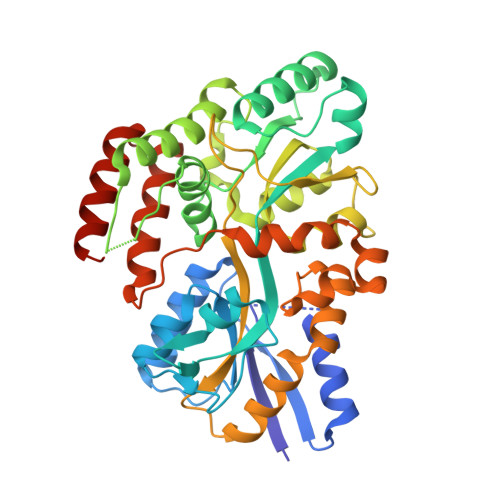Capture-and-release of a sulfoquinovose-binding protein on sulfoquinovose-modified agarose.
Arumapperuma, T., Snow, A.J.D., Lee, M., Sharma, M., Zhang, Y., Lingford, J.P., Goddard-Borger, E.D., Davies, G.J., Williams, S.J.(2024) Org Biomol Chem 22: 3237-3244
- PubMed: 38567495
- DOI: https://doi.org/10.1039/d4ob00307a
- Primary Citation of Related Structures:
8S5B - PubMed Abstract:
The solute-binding protein (SBP) components of periplasmic binding protein-dependent ATP-binding cassette (ABC)-type transporters often possess exquisite selectivity for their cognate ligands. Maltose binding protein (MBP), the best studied of these SBPs, has been extensively used as a fusion partner to enable the affinity purification of recombinant proteins. However, other SBPs and SBP-ligand based affinity systems remain underexplored. The sulfoquinovose-binding protein SmoF, is a substrate-binding protein component of the ABC transporter cassette in Agrobacterium tumefaciens involved in importing sulfoquinovose (SQ) and its derivatives for SQ catabolism. Here, we show that SmoF binds with high affinity to the octyl glycoside of SQ (octyl-SQ), demonstrating remarkable tolerance to extension of the anomeric substituent. The 3D X-ray structure of the SmoF·octyl-SQ complex reveals accommodation of the octyl chain, which projects to the protein surface, providing impetus for the synthesis of a linker-equipped SQ-amine using a thiol-ene reaction as a key step, and its conjugation to cyanogen bromide modified agarose. We demonstrate the successful capture and release of SmoF from SQ-agarose resin using SQ as competitive eluant, and selectivity for release versus other organosulfonates. We show that SmoF can be captured and purified from a cell lysate, demonstrating the utility of SQ-agarose in capturing SQ binding proteins from complex mixtures. The present work provides a pathway for development of 'capture-and-release' affinity resins for the discovery and study of SBPs.
- School of Chemistry and Bio21 Molecular Science and Biotechnology Institute, University of Melbourne, Parkville, Victoria 3010, Australia. sjwill@unimelb.edu.au.
Organizational Affiliation:

















